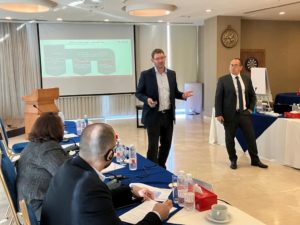
State-society relations are a particularly fraught subject in the Iraqi context. Dictatorship, foreign intervention, civil war, sectarian rivalries and terrorist violence have defined the country’s politics for at least the last three decades. In the aftermath of the recent war with the Islamic State, rebuilding Iraq’s society is a daunting challenge with many potential pitfalls. There are, nevertheless, influential Iraqis who are determined to make progress on resolving the country’s deep divisions and building a stable and successful country. To support this process, the German government-funded project “Promoting dialogue and participation in Iraq” (PDP), implemented by GIZ, has been bringing Iraqi decision-makers together with experts and civil society actors to work on solutions for the country’s political and social challenges.
The GIZ PDP team invited Dr Mark Furness, a senior researcher from the IDOS’ Middle East and North Africa research team, to Iraq to give a seminar at a workshop for Iraqi government officials and policy advisors. The workshop, which was held in Sulaymaniyah in Iraqi Kurdistan from 17 – 19 January, focused on the state-society social contract in Iraq. Dr Furness’ objective was to provide the Iraqi experts with a framework for structuring and analysing the complex relationships between the government and the country’s many social groups.
Dr Furness’ seminar sparked intense discussions among the Iraqi participants. Questions such as what the social contract in Iraq looks like, the status of the 2005 Iraqi constitution, and how marginalised groups can be included, were passionately debated. The participants concluded that there is a great need to think systematically about how the Iraqi social contract functions in order to start addressing its weaknesses. Further discussions among Iraqi political parties, business actors, intellectuals, civil society and minority groups are planned, which will hopefully build both capacity and the political will for reforms in the country.

Schreibe einen Kommentar